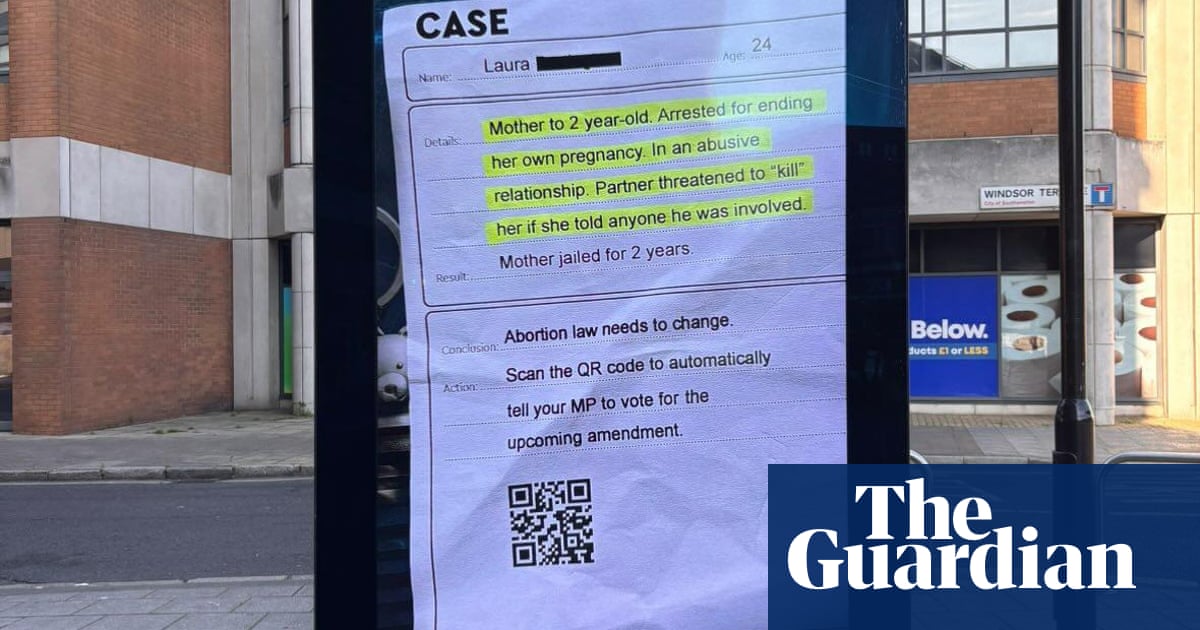The mayor of London,Sadiq Khan, has stepped in to reverse a ban on adverts on the London transport network calling for abortion to be decriminalised.
It is understood that the mayor is seeking an “urgent review” of a Transport for London (TfL)decision to ban the advertsfrom the British Pregnancy Advisory Service (Bpas) charity on the grounds they may bring the Metropolitan police into disrepute.
Bpas had placed the adverts in locations across England and Wales urging people to lobby MPs ahead of ananticipated parliamentary voteon whether to decriminalise abortion.
The campaign posters, which have been approved by theAdvertisingStandards Authority (ASA), feature the anonymised stories of real women who have been investigated by police and in some cases prosecuted after a termination or pregnancy loss.
Bpas was told in correspondence withTfLthat it would not run the adverts because “the proposed advertisement makes serious allegations about the police”. The transport body later said in a statement that the material “did not comply with TfL advertising policy because it made negative references about the police”.
The decision to ban the ads came despite TfL previously allowing pro-choice campaign material on buses across London, sponsored by Doctors for Choice andAbortionTalk and featuring the slogan “abortion is healthcare, not a crime”.
Last year, campaign material on assisted dying from Dignity in Dying was also approved to run on the network, including in Westminster tube station.
Bpas had said it planned to appeal against the TfL decision “at the highest levels” and asked for “an immediate in-depth explanation” of the reasoning behind the rejection.
A source close to theLondonmayor said: “As chair of TfL, Sadiq is going to seek an urgent review of this decision. Women’s voices must be heard.”
It is understood that the mayor is expecting the transport body to act quickly and there to be acknowledgement of the fact that Bpas’s campaign is aimed at changing the law, not criticising the police.
Heidi Stewart, the chief executive of Bpas, said: “This campaign was launched in support of Tonia Antoniazzi MP’s amendment to the crime and policing bill, and we expect a vote in parliament in a matter of weeks. This is a pivotal moment for MPs to reform our abortion law and prevent more women from suffering the trauma and injustice of police investigations and the risk of criminalisation.”
Sign up toFirst Edition
Our morning email breaks down the key stories of the day, telling you what’s happening and why it matters
after newsletter promotion
The amendment to the government’s crime and policing bill would remove women from the criminal law related to abortion inEnglandand Wales. It is backed by charities, trade unions and medical colleges, including Bpas and the Royal College of Obstetricians and Gynaecologists.
A separate amendment, put forwardby the fellow Labour MP Stella Creasy, seeks to decriminalise abortion as well as write into law a human right to access abortion.
Earlier, Antoniazzi said she was “stunned” by TfL’s decision to refuse to run the adverts on its network. “The police cannot be trusted with abortion law – nor can the CPS or the wider criminal justice system,” she said. “My amendment NC1 to the crime and policing bill will give us the urgent change we need to protect women.”
She later said on X that she planned to write to Khan about the “unacceptable” decision and on Sunday said she was “really pleased” that the London mayor had stepped in.
Stewart said: “Ahead of the vote in parliament, it is absolutely vital that the voices of the women who have been so deeply harmed by the current law are allowed to be heard. We urge the mayor to take swift action and allow our charity to share these stories as a matter of urgency.”
